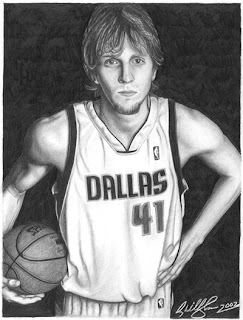
I am always intrigued by people who take sports and use them metaphorically to frame and explain larger more universal paradigms. Malcolm Gladwell has an almost preternatural talent for this. He recently wrote an article for
The New Yorker, "
How David Beats Goliath", that outlines common characteristics of successful underdogs. Using stories like David vs. Goliath, Lawrence of Arabia and the Bedouins vs. the Ottoman Army, and a 1971 basketball game: Fordham vs. Umass, Gladwell illustrates a single underlying trait.
"David can beat Goliath by substituting effort for ability - and substituting effort for ability turns out to be a winning formula for underdogs in all walks of life."
Gladwell's universal example of this is the full-court press in basketball. He theorizes that a press, correctly utilized, gives an underdog the most distinct advantage available to them. It will not guarantee a victory, but it can be the most effective weapon against an over-matched team in terms of talent and ability. So why don't more teams use the press? Gladwell states it is because coaches can not inspire or motivate a team to exert enough effort to execute the maneuver successfully. Rick Pitino, well known for maximizing success with less than premier talent, is a huge advocate of the press. He employed the press in his NCAA championship season and during his NBA tenure. The reason for using the full-court press is because it shifts the paradigm. If you play by David's rules you will lose all the time. If you can change the nature of how the game is played you increase your chances of victory.
Gladwell furthers this discussion with Bill Simmons of ESPN. He extends the discourse of basketball coaches simply refusing to use the press, even though it offers the best possible course for victory, into a wholly American dilemma.
"I wonder if there isn't something particularly American in the preference for "best" over "better" strategies. I might be pushing things here. But both the U.S. health-care system and the U.S. educational system are exclusively "best" strategies: They excel at furthering the opportunities of those at the very top end. But they aren't nearly as interested in moving people from the middle of the pack to somewhere nearer the front."
He then stretches it even farther and suggests that the draft and the "incentive structure" of professional sports is in economical terms a "moral hazard".
"The consistent failure of underdogs in professional sports to even try something new suggests, to me, that there is something fundamentally wrong with the incentive structure of the leagues. I think, for example, that the idea of ranking draft picks in reverse order of finish -- as much as it sounds "fair" -- does untold damage to the game. You simply cannot have a system that rewards anyone, ever, for losing. Economists worry about this all the time, when they talk about "moral hazard." Moral hazard is the idea that if you insure someone against risk, you will make risky behavior more likely. . . No economist in his right mind would ever endorse the football and basketball drafts the way they are structured now. They are a moral hazard in spades. If you give me a lottery pick for being an atrocious GM, where's my incentive not to be an atrocious GM?"
This also brings into question the dubious act of teams dumping games down the stretch to move up in draft position. Though, a profession where men are payed astronomical amounts of money to throw a ball or punch someone can never exactly be ruled by ideas concerning logic and morality. Sports are an odd arena of life that seems to exist without following any sort of cogent methodology, on or off the field. It is an idiosyncratic anomaly that is driven by the bizarre. But there is a tendency to stay in accord with a given praxis. Even if a proven alternative exists that will palliate the opposing team's chance of victory.
Professional sports have never been considered progressive. It is a perpetually backwards looking endeavor. The Hall of Fame and omnipresent statistics are examples of its reverence for the antecedent and nostalgia. Even the relatively simplistic "innovation" of the Wildcat offense in the NFL this year has roots that date back 40+ years. Professional sports habitual adherence to custom and tradition only further estrange themselves from the logical sphere of economics. But is that all bad?

Both articles are excellent and should require a complete review. Mr. Gladwell also has a new book out called, "Outliers".










